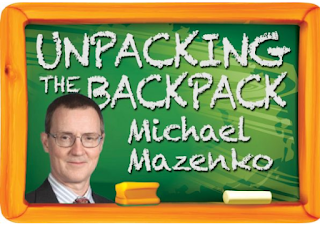When does necessity become luxury? When does comfort become affluence? Thoughts on being comfortable are this week's column for The Villager.
Renowned bioethicist Peter Singer once published an article entitled “The Singer Solution to World Poverty,” in which he spotlighted the increasingly dire need for basic necessities of food, water, clothing, shelter, and medicine in many parts of the world. Singer suggested that prosperous and affluent people in developed countries have a responsibility to provide those necessities to the less privileged. “The formula is simple,” Singer writes. “Whatever money you’re spending on luxuries, not necessities, should be given away.”
Of course, nothing is ever simple, certainly not the challenge of solving world poverty. The beginning point to addressing Singer’s plan would be to first establish a definition of luxury and necessity. And the subjective nature of our experiences makes that nearly impossible. In 2005 when the College Board put Singer’s idea on the AP English exam and asked students to defend or challenge his plan, one clever student asked that simple question with one key example – how necessary is toilet paper? In reality and across history, such a simple commodity is clearly not necessary. That said, few people in contemporary society would agree, unless they recently installed a bidet, which should actually be considered a luxury.
Another key component of Singer’s idea is determining if redistribution of wealth and assets can, in fact, end world poverty. The history of allegedly communist and certainly socialist countries seems to indicate the answer is no. Collectivism simply doesn’t work on any large scale, though small successful communities like a kibbutz suggest collaborative societies are certainly viable. Critics of redistribution are fond of referencing the “Ten Cannots” from Reverend William Boetcker who asserts “You cannot help the poor by destroying the rich.” Incidentally, that platitude is often incorrectly aligned with Abraham Lincoln, a mistake made by Ronald Reagan in his speech at the 1992 Republican Convention.
Granted, Boetcker words are simple platitudes which don’t necessarily make them valid or true. On the other hand, the ideas of Peter Singer are not simple quips, but instead the summation of decades of research and investigation. And, as a professor of philosophy and ethics, Peter Singer is an advocate for practicing what he preaches, giving away a large amount of his earnings over his lifetime. In fact, following his winning of the 2021 Berggruen Prize, Singer quickly announced he will not keep the million dollar prize, instead distributing it among his charitable foundations. Thus, it’s not easy to dismiss Singer’s ideas when backed up by his actions, and it should make us question our ideas about luxury and necessity.
As a middle-class wage earner living in contemporary suburban America, I try to remind myself that by nearly every measure, I am one of the wealthiest people in all of human history. The relative comfort in which I live and the conveniences that I take for granted as basic necessities of life could be considered luxury and even a lavish lifestyle when compared to the majority of the world’s population. In fact, compared to the record of human history, I am in many ways more comfortable, if not actually wealthier, than kings and queens of yesteryear.
What does it really mean to be “comfortable”? In a world of increasing wage and wealth gaps, the concepts of comfort and middle class have become muddled. Wharton Business School professor Nina Strohminger recently asked her students what they thought the average American worker makes annually. One-quarter of them thought it was more than six figures, and one student actually guessed $800K – the actual answer is $45K a year. The aloof nature of elite business students is unsettling to say the least, and it complicates talk of comfort. In fact, a Denver area realtor recently told the Denver Post, the measure of a “luxury home” is no longer a million dollars. In determining luxury and wealth, “it really starts at two million.”
Americans have a strange relationship with wealth and status, striving diligently for it, then liking to pretend they haven’t made it. In fact, the news and social media is filled with stories of people talking about “struggling” financially while living upper-middle class lives. Instead of calling themselves rich, affluent, or wealthy, many Americans tend to refer to themselves as simply “comfortable.” Such modesty is a rather significant understatement, though everything is, of course, relative. People can downplay affluence as mere comfort, but for Peter Singer and the world’s four billion people living on five dollars a day, that’s a bit hard to accept.

No comments:
Post a Comment